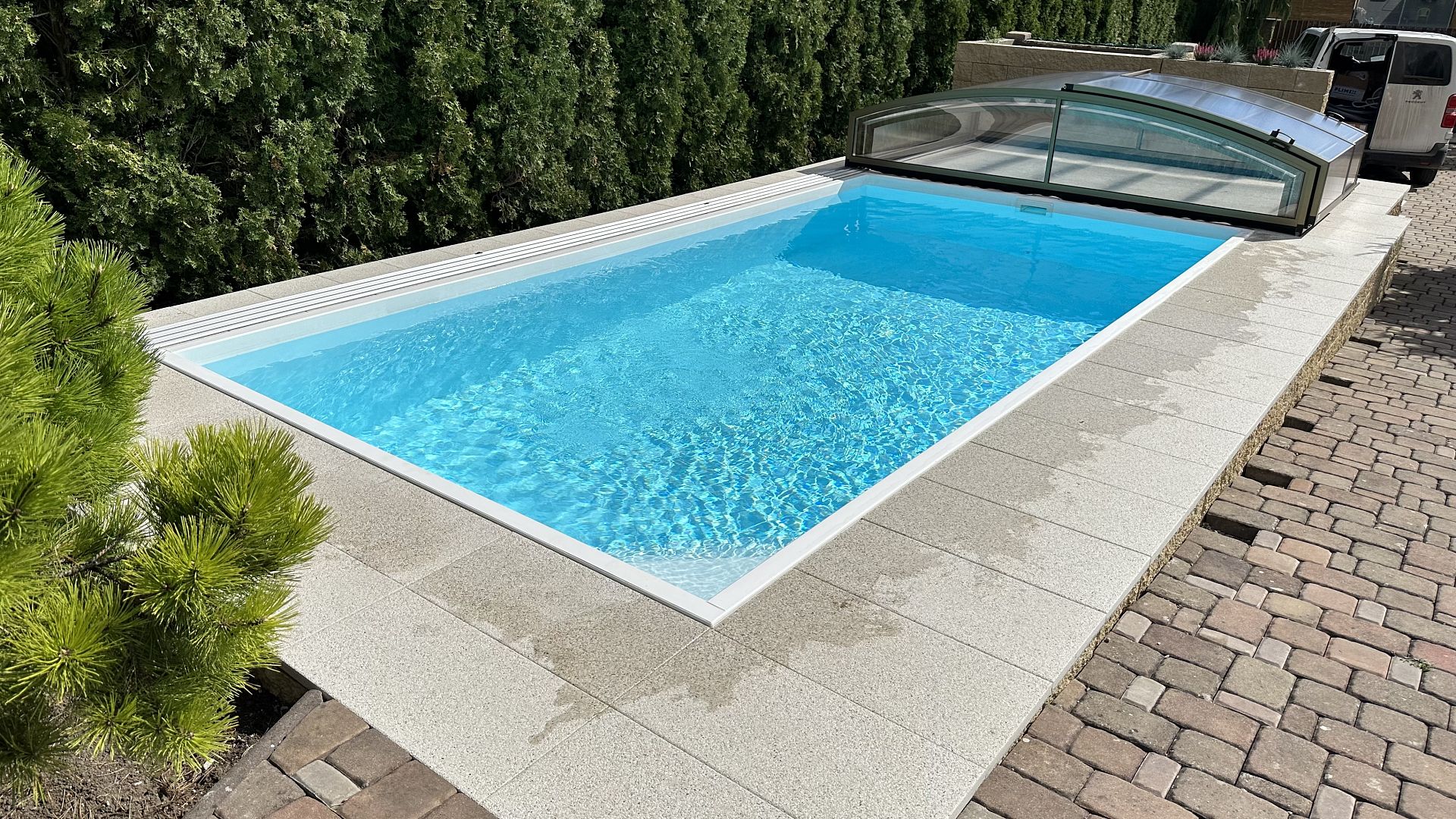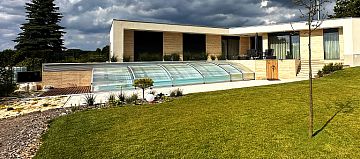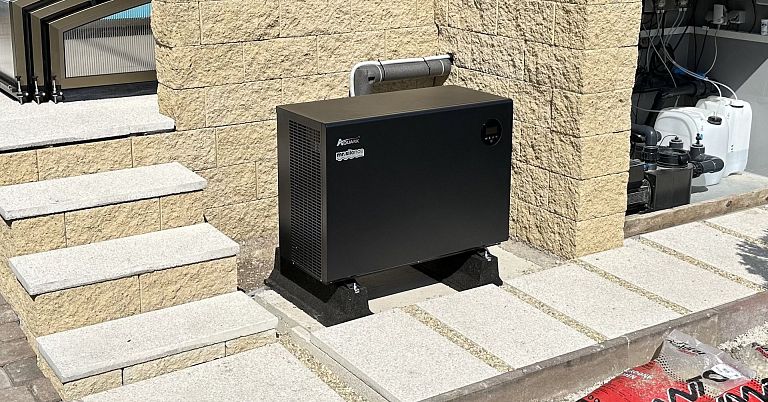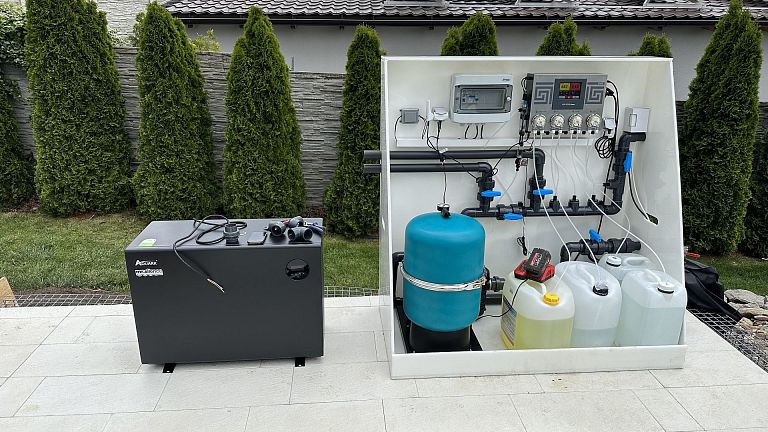Plastic, laminate, stainless steel or traditional concrete? In this article, we will compare the suitability, quality and price of the different materials used to make swimming pools so that you can better know how to choose a pool. We will also focus on durability, susceptibility to damage and the possibility of possible repairs.
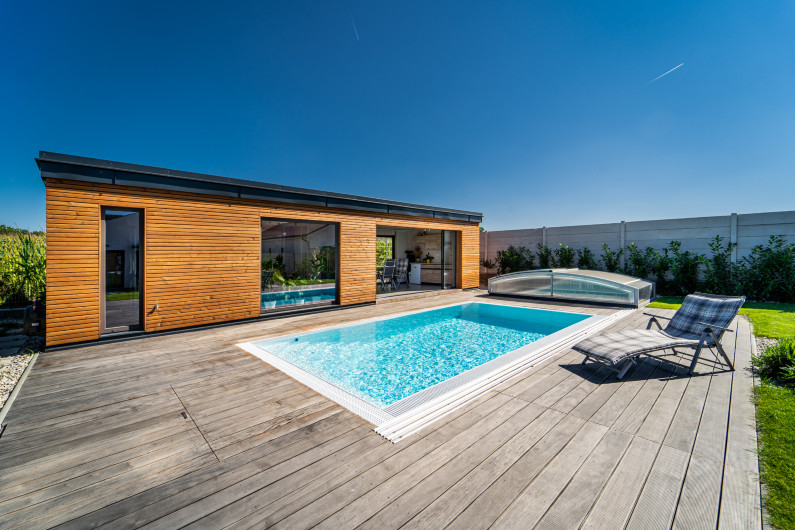
Which material to get a pool made of?
You will find a really wide variety of pool materials used in the market today. Plastic and laminate are the most popular, but you can also come across stainless steel, concrete or pool liner. So what materials are on offer and what are their benefits?
Plastic pools
They are made from individual welded parts, which can achieve a huge variation in shape. For in-ground reinforcement, plastic pools often use external reinforcing ribs. The service life of lower quality plastic pools is between 10 and 15 years. However, today's modern plastics can last up to 50 years.
Advantages of plastic pools
- lower purchase price
- best price × lifetime ratio
- high durability, frost resistance and colour fastness
- low susceptibility to mechanical damage
- complete freedom to choose a tailor-made pool shape
- customised pool steps in any pool location
- easy repairs thanks to the exchange and welding of a replacement piece
- simple construction and installation
- also suitable for salt water
Some of the disadvantages of plastic pools include the visibility of the joints between the parts, susceptibility to cracking and dirt settling in the joints. However, this can be avoided by purchasing a plastic pool from a proven manufacturer who emphasises the quality of manufacturing pools from premium plastics. In addition, a recessed plastic pool requires a larger excavation with a reinforced base plate 10-20 cm high, spacers and pool insulation.
Laminate pools
These are pools made of fibreglass, a mixture of fibreglass and resin. During production, the material is applied to a mould, which clearly determines the shape and size of the fibreglass pool. The lifespan of fibreglass pools ranges from 30-40 years.
Advantages of laminate pools
- smooth surface without joints
- the material can be renovated and even scratches can be polished out
- less susceptible to crushing and no need for spacers during construction
- lower base plate with 10 cm curry net
- saltwater compatible
The disadvantage of laminate pools is the limited choice according to the company's catalogue and the limited production size. Compared to plastic pools, the production of a laminate pool is demanding and requires more expertise in construction and installation. Fiberglass pools are susceptible to scratches, tend to be fragile, offer less insulation and are less resistant to UV rays.
Concrete pools
The popularity of concrete pools is now a thing of the past. Concrete pools used to be made to measure in gardens and tiled. Today, pool liners are put up or special coatings are applied to these older and often unusable pools.
Advantages of concrete pools
- great variability in shape
- beautiful design thanks to tiles or mosaics
- virtually unlimited service life
Concrete pools are characterised by time-consuming and technically demanding construction using high-quality waterproofing and grouting. Regular and very careful maintenance is also essential. Paradoxically, although they used to be often placed outdoors, they are not suitable for outdoor pools due to the thawing of the paving during the winter months.
Stainless steel pools
Although they have a number of advantages, due to their very high cost they are usually only used in public swimming pools.
Advantages of stainless steel pools
- great variability of shapes
- long service life of over 30 years
- mechanical and chemical resistance
- resistance to weather and UV radiation
- excellent hygienic properties
The biggest disadvantage is the highest purchase price of all the pools mentioned. In addition, it is also difficult to build and the fact that the surface of a stainless steel pool is hot on warm summer days contributes a lot to the price. And if you want salt water in your pool, a stainless steel pool won't be the right fit either.
Foil pools
Pool liners are seen in above ground or concrete pools. A quality pool liner will last well over 30 years and is definitely not worth skimping on.
Benefits of foil pools
- great variability of use
- Variety of colours and printing patterns
- Lifetime of over 30 years with quality foil
- quick replacement in case of damage
- can be used to repair older pools
The purchase price of a foil pool is relatively high, although the foils are very susceptible to damage from sharp objects. At the same time, foil pools require high construction requirements and careful selection is necessary as not all foils are UV resistant and lose colour over time. The price/performance ratio for foil pools is simply not always in balance.
Premium plastic pools from Morava Ekol
We at Morava Ekol have chosen plastic, specifically premium polypropylene, to manufacture our pools because it can be easily made into a bespoke pool and can last up to 50 years. You can choose between oval, rectangular, circular, kidney or any other shape of pool. The location of the staircase, the number and type of lights or the presence of air vents will also be up to you. Thanks to our special technology, you don't have to worry about joints cracking or water leakage.
The quality of the pool is also related to the quality of the pool technology. At our company we offer sand filtration, pool water disinfection, pool distributors, pool pumps, pool vacuum or smart control. For all technology we are happy to carry out the necessary service, repair or replacement.
The price of a quality swimming pool
Plastic is generally the cheapest material to manufacture swimming pools. Laminate also works out well for the price, whereas concrete or stainless steel will get very expensive. At our company, we emphasize quality, customer's wishes, while not putting a strain on your wallet.
The total price of a customized pool not only depends on the material chosen, the size, shape and type of pool, the appearance and location of the steps, the pool equipment, the chosen technology, the installation of the pool roof or the purchase of the pool tarpaulin and the installation of heating systems. Excavation and landscaping work and any soil removal must also be included.
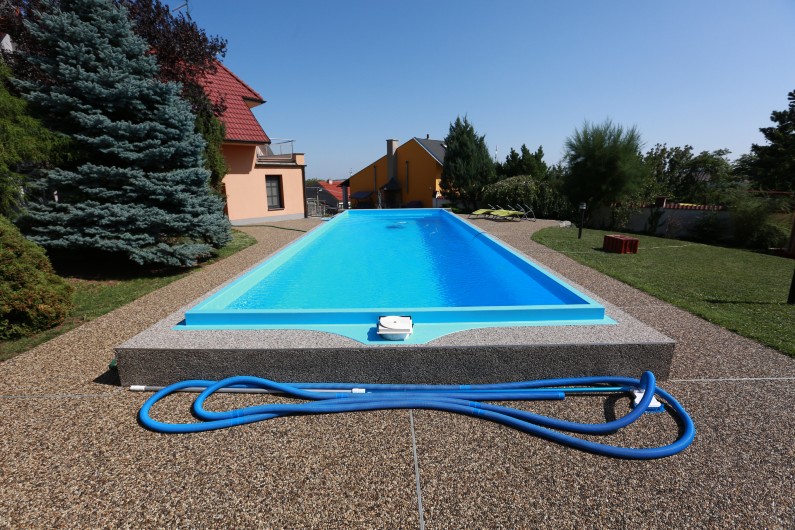
Where does which type of pool fit
When siting your pool, you should first consider whether you want an above ground, semi-submerged or fully inground pool. Next, you'll have to choose between a skimmer pool and an overflow pool. Our article on overflow vs. skimmer pools will help you with this choice. The location of the pool technology also plays an important role in the choice of site.
So what material to choose based on the location of the pool? Opinions on the suitability of materials vary and there is no clear-cut solution to this question. In our experience, we can recommend plastic pools for indoor, outdoor and public areas.
Why choose pools from Morava Ekol?
Plastic pools are the best combination of price, aesthetics, quality and fast installation. You can rely on quality products for up to 50 years. Thanks to quick installation and simple repairs, you will love your plastic pool. Simply choose your dream shape, order your pool and we'll take care of everything else - from fabrication, to excavation, to installation and commissioning.
See for yourself the quality of our work on the projects we have already completed. We are here for you whether you want a customized pool with stairs or a sewage treatment plant. We are a Czech company that has been on the market for over 30 years. We produce swimming pools even for demanding foreign clients. We pay attention to quality, education of our employees and at the same time we keep reasonable prices. We have our own patented technology in the field of wastewater treatment. Please contact us with any questions. We are also available by phone at +420 519 419 525 or by email at info@morava-ekol.eu. We look forward to working with you.








